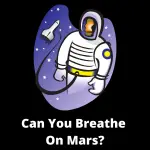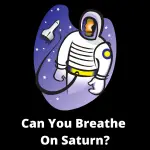No, you cannot breathe on Jupiter.
In the article that follows, we’ll explain.
Can You Breathe On Jupiter? (EXPLAINED)
Relevant Facts About Jupiter
Jupiter is the 5th planet from the sun, after Mercury, Venus, Earth, and Mars.
It is the biggest planet in our solar system, and is widely known as a “gas giant.”
Most of Jupiter is made of gas, namely hydrogen and helium.
Deep inside the planet, scientists believe that the core of Jupiter just might be solid.
That core is probably still hydrogen and helium, just under such incredible pressure that the elements change phase from gaseous to solid.
There’s no way to “land” on Jupiter or walk on Jupiter, as there is no crust or solid surface.
Jupiter’s atmosphere is made of hydrogen and helium (like the planet) as well as some methane and ammonia.
While there’s no surface pressure (since there is no surface), the atmospheric pressure around the planet is about the same as that of Earth at sea level.
The density of the atmosphere is similar to Earth’s as well.
Relevant Facts About Human Respiration
The air humans breathe on Earth is made up mostly of nitrogen, followed by oxygen.
In fact, the air we breathe is only 21% oxygen, and 78% is nitrogen.
We inhale the nitrogen, and then exhale it, along with carbon dioxide and the other elements/compounds that are in the air that our bodies do not utilize.
If humans breathe in a substance which does not have a balance of the right amount of oxygen, humans do not function well at all.
For example, if you ascend a mountain to a height where the atmosphere is thinner and there are fewer oxygen molecules for you to breathe in, you can loss consciousness or even perish.
If you breathe in a mixture of air that has too much oxygen in it, over time the body takes in too much of the compound, which can cause permanent damage to the human body.
Why Can’t Humans Breathe On Jupiter?
The primary reason humans can’t breathe “on” Jupiter is that we can’t get to any place that is considered “on” Jupiter.
Jupiter is not solid, so you are either “off” or “over” Jupiter or “In” Jupiter if you get close enough.
Second, around Jupiter, the atmosphere is composed of hydrogen, helium, ammonia, and methane.
If there is oxygen in the atmosphere, there isn’t enough of it for a human to breathe and survive.
All other considerations aside (like what would happen to you in the atmosphere of Jupiter if you tried to take your helmet off), if you tried to breathe in the “air” around Jupiter, you’d feel similar to how you’d feel if you were holding your breathe.
Like there wasn’t enough “air” in the room, despite your efforts or even success at taking in whatever gas that is available into your lungs.
Another challenge is the temperature of the “air” in the atmosphere you are trying to breathe.
First, as we’ve said, there’s no oxygen.
Second, the air might be so cold (maybe as cold as more than minus 200 degrees Fahrenheit) that any attempt to breathe in the frigid Jupiter air would cause catastrophic damage and death.
Some people think that trying to breathe the atmosphere around Jupiter would be the same as trying to breathe out in open space.
While both are deadly, the body would react differently to the attempt.
Open space is a vacuum, without any pressure.
If you were to expose your mouth to breathe in space, the lack of pressure which probably cause quick death as the gas in the body tried to expand to achieve equilibrium.
Since Jupiter has atmospheric pressure, death would not result from the gas trying to quickly escape out into space.
Jupiter Could Be Deadly In Many Ways
Let’s face it.
There’s not really a chance that humans will every try and live on/in/over Saturn, much less get close enough to try and breathe there.
While there are several attractive moons in Jupiter’s vicinity, the planet itself is likely to kill humans all different kinds of ways.
The planet’s atmosphere is deadly cold, and made up of gases that we can’t breathe.
The atmosphere could also be corrosive to tech/ships.
The gravity is more than 2.5 times that of Earth, which would chew up fuel resources.
It is incredibly windy and stormy.
The strong magnetic field which probably results from the size of the planet at the rotational speed creates a radiation that would also kill us humans. (The field is 14x stronger than Earth’s magnetic field).
We’ll be better off exploring the moons.
Did You Know? (Other Facts About Jupiter)
Here are some facts you may not have known about Jupiter:
- Jupiter, for all that it is a huge planet, spins really fast (it’s actually the fastest). It takes less than 10 Earth hours to rotate on its axis one time. As a result of this speed, the planet is not truly shaped like a sphere. Instead, it bulges at its equator, like something is squeezing it at its north and south poles.
- The weather on Jupiter is turbulent, with winds of over 400 miles per hour. There’s a storm we can see from Earth that has been roiling for over 300 years (The Great Red Spot). However, for all their force and fury, the clouds around Jupiter aren’t that thick.
- Jupiter has around 80 moons, some of which might be made habitable by and for humans (like Europa, Enceladus, and Titan).
- It may rain diamonds in the atmosphere around Jupiter. (Methane reacting with lightning during storms, carbon being compressed by pressure into diamonds, which fall)
Wrap Up
Jupiter is a fascinating planet, and we look forward to learning more about it as the progress of space exploration continues.
You might also enjoy:







